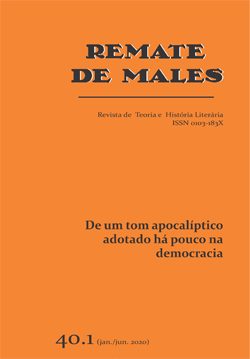Abstract
The taxonomy of humanity can be dictated by numerous categories: civilization, race, ethnicity, tradition, culture and so on. While often perceived only as descriptive and "fixed naturally", none of these categories is able to specify the identity of a particular group without committing some conceptual inconsistency or offering a reasonably coherent and systematic classification of the human species in general. Still, it is impossible to say that they are unreal or merely illusory. On the contrary, they constitute the social reality and play significant roles in the discrimination of one group of people from and in opposition to others. The West – likewise, with its symmetrical opposite, the Rest of humanity – is one of those clearly defective categories in the rationality of its conceptual coherence. She has no consistency unit. Rather, it presents itself as a putative unit, and contains contradictions in itself, so that it can be unified only in the future. It is a social imaginary that functions primarily as a myth on a global scale, such as race. Still, unlike race, it tends to present a cartographic association. Due to this affinity with cartographic imagination, the dichotomy between the West and the Rest is often invoked as a schematic trope of dialogue in order to denote and understand various instances of social conflict and distancing in spatial terms, but with the result of postulating the West and the Rest as territories, as geographical delimitations. This article then questions how can the West exist?
References
BALIBAR, Étienne. Citizen Subject. In: CADAVA, Eduardo; CONNOR, Peter; NANCY, Jean-Luc (Eds.). Who Comes after the Subject? New York/London: Routledge, 1991, pp. 33-57.
BHABHA, Homi. The Other Question –/Stereotype, Discrimination and the Discourse of Colonialism. In: BHABHA, H. (Ed.). The Location of Culture. London/New York: Routledge, 1994, pp. 85-92.
BOURDIEU, Pierre. Distinction – Social Critique of the Judgment of Taste. R. Nice (Trans.). Cambridge, MA: Harvard University Press, 1984.
CHEN, Wanyi. Yume to Genjitsu [Dreams and Reality]. In: SHIMOMURA, Sakujiro et al. (Eds.). Yomigaeru Taiwan bungaku [Resurrecting Taiwanese Literature]. Tokyo: Tôhô Shoten, 1995, pp. 389-406.
CHOW, Rey. Primitive passions –/Visuality, Sexuality, Ethnography, and Contemporary Chinese Cinema. New York: Columbia University Press, 1995.
CRITCHLEY, Simon. Post-Deconstructive Subjectivity? In: CRITCHLEY, S. (Ed.). Ethics, Politics, Subjectivity. London/New York: Verso, 1999, pp. 51-82.
DELEUZE, Gilles; GUATTARI, Felix. A Thousand Plateaus. B. Massumi (Trans.). Minneapolis: University of Minnesota Press, 1987.
DURAS, M. Sea Wall. H. Griffault (Trans.). New York: Farrar, Starus & Giroux, 1985.
DURAS, Marguerite. The North China Lover. L. Hafrey (Trans.). New York: New Press, 1992.
DURAS, Marguerite. Un barrage contre le Pacifique. In: Romans, cinéma, théâtre, un parcours 1943-1993. Paris: Gallimard, 1997[1950].
DURAS, Marguerite. The Lover. B. Bray (Trans.). New York: Pantheon Books, 1998.
FOUCAULT, Michel. The order of Things. New York: Random House, 1973.
HAGE, Ghassan. White Nation-Fantasies of White Supremacy in a Multicultural Society. Annandale/Australia/West Wickham, UK: Pluto Press, 1998.
KOMORI, Yoichi. Higashi kara nishi e, nishi kara higashi e. In: KOMORI, Yoichi. (Ed.). / no nakano Nihon-bungaku (Japanese Literature in Oscillation). Tokyo: NHK, 1998.
LEGENDRE, Pierre. L’amour du censeur: essai sur l’ordre dogmatique. Paris: Éditions du Seuil, 1974.
NISHIDA, K. Z. Hataraku mono kara mirumono e [From that the Agency of Functioning to the Agency of Seeing]. Vol. 4, Nishida Kitarô Zenshuû . Tokyo: Iwanami Shoten, 1965a.
NISHIDA, Kitaro. Ippansha no jikakuteki taikei [Determination in Terms of the General in the Awareness of the Self]. Vol. 5, Nishida Kitarô Zenshuû. Tokyo: Iwanami Shoten, 1965b.
NISHIDA, Kitaro. Muno jikakuteki gentei [Determination in Terms of Nothingness in the Awareness of the Self]. Vol. 6, Nishida Kitarô Zenshuû. Tokyo: Iwanami Shoten, 1965c.
SAKAI, Naoki. Voices of the Past. Ithaca/London: Cornell University Press, 1991.
SAKAI, Naoki. Translation and Subjectivity. Minneapolis/London: University of Minnesota Press, 1997.
STOLER, Ann Laura. Carnal Knowledge and Imperial Power. Berkeley/London: University of California Press, 2002.
TARUMI, Chie. Taiwan no Nihongo bungaku [Japanese Language and Literature in Taiwan]. Tokyo: Goryü Shoin, 1995
WATSUJI, Tetsuro. Climate and Culture. G. Bownas (Trans.). Tokyo: Japanese Ministry of Education, (1961).
WATSUJI, Tetsuro. Fūdo. Vol. 8. Tokyo: Iwanami Shoten, 1963.

This work is licensed under a Creative Commons Attribution-NonCommercial 4.0 International License.
Copyright (c) 2020 Creative Commons Licence


